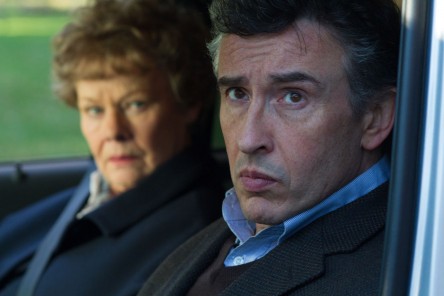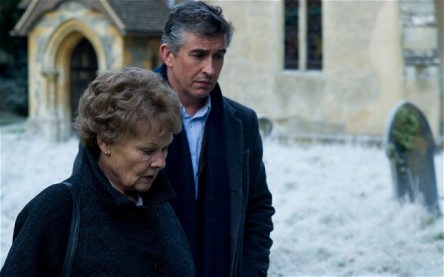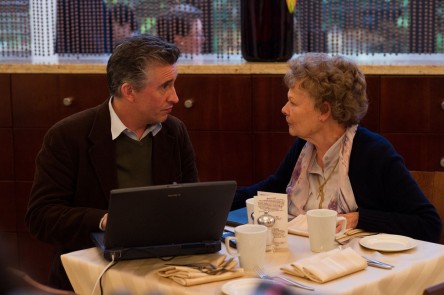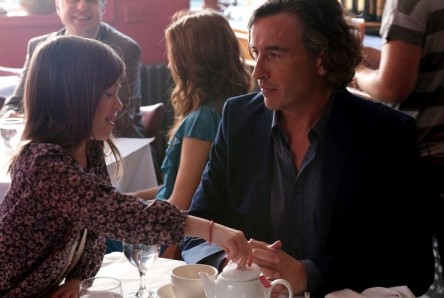British actor and comedian Steve Coogan, the quick-witted, prolific star of such notable comedies as 24 Hour Party People, Tropic Thunder, In The Loop, The Trip and scores of other memorable works including his BAFTA-winning, media-lampooning signature character Alan Partridge, has entered a new career phase this year with startlingly accomplished dramatic turns in the lacerating What Maisie Knew, as a father who abandons his young daughter, and his new picture, Philomena, the true story of an Irish Catholic teen whose son was ripped away from her by cruel nuns fifty years prior.
In a film he co-wrote and produced after doing exhaustive research with its real life participants Philomena Lee and reporter Martin Sixsmith, whose book The Lost Child of Philomena Lee, about Lee’s odyssey to find her lost son, inspired the screenplay, Coogan is both comically and dramatically affecting opposite Judi Dench as the titular Lee, a simple, gracious woman who holds no grudges against the Catholic church for its transgressions upon her.
Sixsmith, as played by Coogan as a lapsed, non-believing Catholic journalist with unresolved personal and professional issues, is one of the year’s memorable straight-man characters, tossing off humor and pathos effortlessly. It’s quite a performance from a screenplay that won him the 2013 Venice International Film Festival prize, shared with co-writer Jeff Pope.
I caught up with Steve Coogan recently to chat about Philomena’s currents of religion, faith and the dignity of its ordinary heroine on her extraordinary maternal quest, as well as the symmetries between (his) life and art.
 Philomena, a relatively simple woman, is depicted in your screenplay and by Judi Dench as a person of dignity and character. That’s not often the case in American movies, where simple people can often be broadly drawn or be cause for ridicule. Philomena is a full human being.
Philomena, a relatively simple woman, is depicted in your screenplay and by Judi Dench as a person of dignity and character. That’s not often the case in American movies, where simple people can often be broadly drawn or be cause for ridicule. Philomena is a full human being.
When I originally read the material in the newspaper, I had the same reaction and I wanted to capture that. It actually made me cry when I read it. But then I looked at the photo of Philomena and Martin and they were both laughing, and I wanted to get that somewhere in this tragic story. I knew they must have gotten to somewhere where they are having a laugh together. But how could I get that? And so because I connected with it on a material level, because I am half Irish and raised Catholic, I thought I knew enough about this material to not fall into the trap of railing against religion; neither did I want to be too liberal intellectual and scared to have a laugh at an old, Irish lady. We do laugh at her a bit. We tease her. But we also dignify her. It’s okay as long as you get there. Some people have said, ‘It’s patronizing to old Irish ladies to say that they sometimes say stupid things.’ Well, sometimes they do say stupid things. It’s okay to make that conversation as long as you couple it with showing what is beneath that. When I was growing up I knew a lot of old, Irish ladies and there was a dignity. As long as you recognize that, you are on solid ground.
Judi Dench is extraordinary in the role. You certainly went for the best in casting Philomena herself.
When we were talking about who should play Philomena, my co-producer Gabby Tana said, ‘Judi Dench.’ I said, ‘Whoa. That is very ambitious.’ She said, ‘Why not?’ I had never met Judi before, but I got in touch with her agent. One thing about being successful in my field is that when you get to a certain level, people return your calls. And that’s great! Also, because it was counterintuitive, that can be attractive—Steve Coogan and Judi Dench—people say, ‘Oh, okay, you have this comic actor and a grand dame.’ It makes it interesting, rather than one classy actor and another classy actor. Then you say, ‘Okay, I know what that is.’ I asked (co-writer) Jeff Pope, ‘Do you think she would do this?’ And he said, ‘There are not loads of great roles for older actresses. This will give her something to sink her teeth into.’ And I’m an actor, and I know that good actors always want to stretch themselves a bit so that they don’t to do the same goddamned thing all the time. Unless they just want to… earn millions! Some of these comic actors are like, ‘I don’t mind doing the same thing every time. I’m earning a shitload of money!’ But when you are not in that league, you want to at least do stuff that is different. She also did this movie called Iris, and she was very, very unglamorous in that as a woman suffering from Alzheimer’s. It was very different. So I went to her house and told her the story, and she was like, ‘I really want to do this.’
 What’s also surprising here is that neither Philomena nor Martin undergoes a radical personality conversion as screenwriting sometimes dictates. By the end of their journey they understand each other, yet essentially remain true to their cores.
What’s also surprising here is that neither Philomena nor Martin undergoes a radical personality conversion as screenwriting sometimes dictates. By the end of their journey they understand each other, yet essentially remain true to their cores.
Yes. He doesn’t find God, and she doesn’t realize there is no God. I didn’t want that because life is not like that. And also, I wanted each of them to be accepting of who the other is. It’s all based on a true story. It comes from a real place in terms it being based on interviews I did with Philomena and Martin; not just from Martin’s book. I said to Philomena, ‘Do you forgive them for how they treated you?’ She thought about it and said, ‘Yes, I do.’ Her daughter, Jane, said, ‘I don’t.’ They sat next to each other and were very comfortable with their different responses.They reacted differently.
You were raised Catholic so you have a unique vantage point on this project and subject matter.
I’m not Catholic anymore, but there are people in my life who are and I respect that. So when I pointed the finger at the church, I didn’t want to throw in the ordinary people with dignity, like Philomena, who live quiet lives and are ignored. They are indirect victims of the scandals that have engulfed the church. My parents were like that, and fostered children that were abused. I didn’t want to piss on their beliefs. So you can do both of those and there is a way through that. I had a conversation with myself and thought, I do have lots of things I believe in—art, Shakespeare… I think art can enrich people’s lives. How would I feel if my parents said, ‘You’re right Steve. It’s all a load of bullshit. There is no God.’ How would I feel? I’d be devastated! So you find a way of saying, ‘This is what I believe, and I respect what you believe.’ We don’t need to win an argument. As long as neither of us are hurting people it’s okay to have different views. There is enough in common. I learned that nobody has a monopoly on wisdom and it’s good for everyone to have a little doubt. The other thing that I am certain of is that you shouldn’t have moral certainty. And anyone who says that is dangerous; that’s fundamentalism. Where you can come together is when people say, ‘I haven’t got all the answers.’ Sort of like the end of the movie. You are not wrapping it up in a little bow. He is standing next to her.
 Right. The film is clear that religion can be a force for good or evil. Perhaps it is more opposed to organized religion and more in favor of personal faith.
Right. The film is clear that religion can be a force for good or evil. Perhaps it is more opposed to organized religion and more in favor of personal faith.
Yes. I remember during the Celtic Tiger period in Ireland when the economy boomed big time for years and no one was leaving anymore; they were all staying there. There had been an exodus in Ireland that slowly went into reverse and people realized, ‘We’ve got it all here.’ In some ways as the influence of religion then diminished and where the church had once had a stranglehold, the baby was thrown out with the bathwater because the people who actually valued things beyond the material, which is what religion does, (understood that) things are not the most important thing. Just the notion that we are trying to do something in the world other than have a nice car—I like nice cars—but that notion was lost along the way. It needed to be a conversation. And there is a lot of debate in Ireland about this film right now, and most of it in our favor. Many Catholics understand the criticisms, and the ordinary people are dignified by it. All that has to happen is, as I say in the film, is to ‘say sorry.’ And also, when I was researching the film and retracing Martin’s footsteps, I could find the graves of the nuns but not of the babies and the mothers. It was only just before I was about to make the film that I found a letter to Jane, Philomena’s daughter, that said, ‘I found the graves of the babies and the mothers. You might not want to show this, because the babies’ graves were overgrown with four feet of weeds.’ You had to search to find the graves. I was like, ‘If you can look after the graves of the nuns, why the hell not the babies and mothers?’ How the church has dealt with this is that it should all just go away.
I’d like to ask you about a performance of yours that really struck me this year—and that was your dramatic work in What Maisie Knew, one of the year’s best movies. You’re a parent in that one, and you must have had a unique take on your character, a father abandons his daughter.
I have a daughter and stepson, but I’m attracted to characters sometimes for personal reasons; people who are imperfect. In my own life I think I behave better than the character in that movie, but of course I have failings and you have to channel those into what you do. And I like to find the humanity in people who behave badly. That is maybe kind of a Catholic thing too.
You talk about finding the humanity in that role. I think there are some very human and complex moments, for example, the scene in the restaurant and certainly the final moment of goodbye in the taxi. Since Philomena and What Maisie Knew were such departures for you, do you see yourself as a comic actor, or just an actor who happens to do comedy?
I love comedy, but I got into it by default; my background is as an actor. And even though I’m known for comedy, as the years go by I want to use my acting background for something else. I wanted more meaning and I had craved more substance. I found What Maisie Knew at a time when I was pissed that I wasn’t being able to get the gigs I wanted. I’d rather use comedy to talk about important things.




